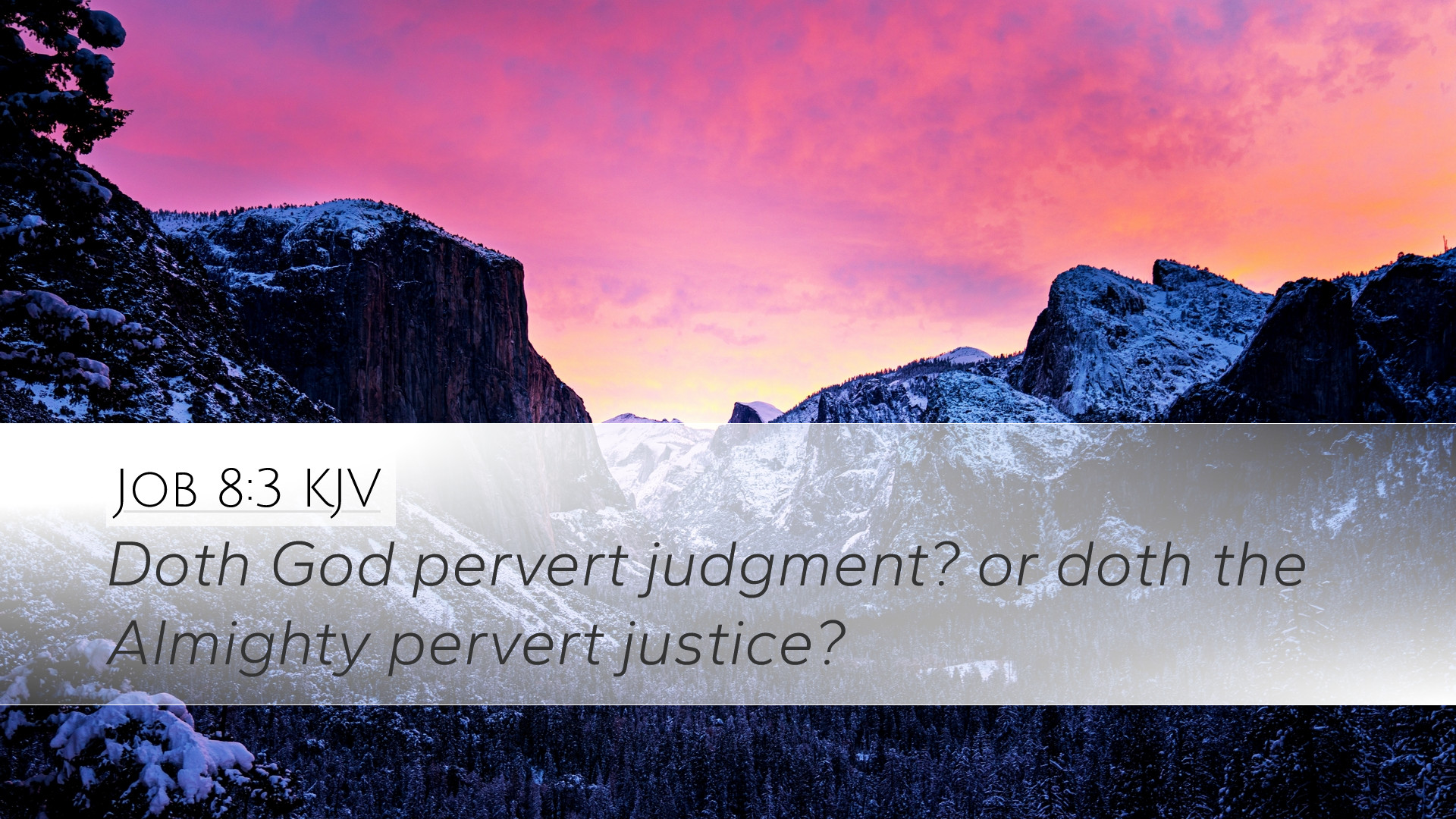Old Testament
Genesis Exodus Leviticus Numbers Deuteronomy Joshua Judges Ruth 1 Samuel 2 Samuel 1 Kings 2 Kings 1 Chronicles 2 Chronicles Ezra Nehemiah Esther Job Psalms Proverbs Ecclesiastes Song of Solomon Isaiah Jeremiah Lamentations Ezekiel Daniel Hosea Joel Amos Obadiah Jonah Micah Nahum Habakkuk Zephaniah Haggai Zechariah MalachiJob 8:3
Job 8:3 KJV
Doth God pervert judgment? or doth the Almighty pervert justice?
Job 8:3 Bible Commentary
Commentary on Job 8:3
Verse Reference: Job 8:3 - "Doth God pervert judgment? or doth the Almighty pervert justice?"
Overview of Job 8
This chapter features the speech of Bildad the Shuhite, one of Job's friends, who responds to Job's lament over his suffering. Bildad emphasizes the importance of justice and suggests that Job's afflictions must be a result of his sin.
Thematic Insights
- Divine Justice: Bildad’s assertion about God's nature concerns the fundamental principle of divine justice. As he questions whether God perverts judgment, he implicitly affirms that God is just and fair in His dealings with humanity.
- Human Suffering and Righteousness: Bildad presumes a direct correlation between human suffering and wrongdoing, a theme prevalent in ancient Near Eastern thought. His reasoning reflects a simplistic view that does not account for the complexity of theodicy as later articulated throughout Scripture.
Commentary Insights
Matthew Henry’s Perspective:
Henry emphasizes that Bildad represents a common mindset among people seeking to understand suffering. He points out that the notion of God as the ultimate judge reinforces the belief that no injustice exists in God's governance. According to Henry, Bildad's questions highlight human perception of God’s righteousness and the belief that earthly sufferings are always a consequence of divine punishment. However, he also notes that this view is criticized throughout the book as it oversimplifies the nature of human suffering.
Albert Barnes’ Interpretation:
Barnes identifies the rhetorical nature of Bildad's questions in Job 8:3, suggesting that they underscore a foundational truth about God's character. He points out that accusing God of being unjust diminishes the sovereignty and holiness of the Creator. Barnes highlights that Bildad demands adherence to the principle that God governs the world with strict justice, implying that Job’s current calamities suggest a lapse in personal integrity. His arguments serve as a remonstrance against Job’s previous complaint and seek to revert the conversation to the need for Job to repent and return to righteousness.
Adam Clarke’s Commentary:
Clarke states that Bildad’s approach is marked by an attempt to reestablish traditional beliefs about divine retribution. His inquiry whether God perverts justice is an affirmation rather than a doubt concerning God's justice. Clarke critiques Bildad’s reductionist philosophy that equates suffering with sin without recognizing the greater mysteries of divine providence. Since Clarke emphasizes the depth of God’s mercy alongside His justice, he critiques Bildad's logic while acknowledging the poignant questions raised that lead to profound discussions of God's nature.
Theological Implications
- The Nature of God: The verse prompts serious theological reflection on the nature of God as just and the implications for human understanding of suffering. It challenges the reader to consider how God's justice coexists with human suffering and questions surrounding theodicy.
- Human Understanding of Divine Will: The questions posed call into consideration human limitations in comprehending God's purposes. This necessitates a humble approach towards interpreting divine justice amid our experiences.
Application for Pastors and Theologians
Pastors and Bible scholars should approach Job 8:3 with sensitivity to the suffering of their congregants and communities. It is vital to recognize the diversity of experiences with suffering, avoiding simplistic interpretations that correlate suffering directly with sin. Instead, the verse can encourage deeper discussion about trusting in God's character, His justice amidst chaos, and the necessity of grace in interpreting personal trials.
Furthermore, this verse serves as an important reminder of the need for pastoral care that is rooted in scripture and informed by the entire narrative of Job, which ultimately leads to a deeper understanding of God’s multifaceted nature. The insights from public domain commentaries encourage introspection and provide deep theological discussion suitable for teaching and preaching.


